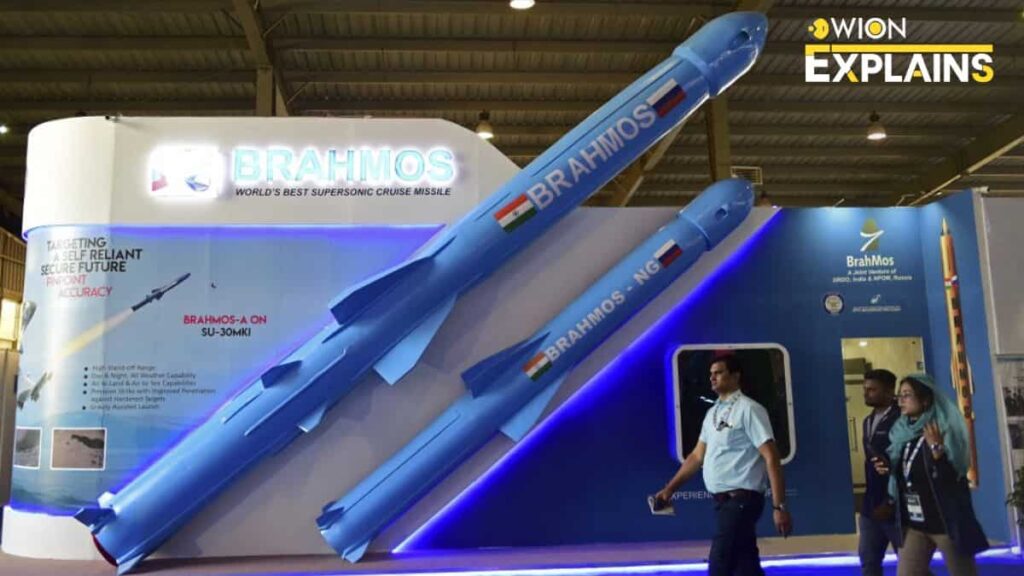
Explainer: India pushes the pedal on Brahmos export
India’s push for BrahMos missile exports is part of Delhi’s focus to become a net exporter and manufacturer of defence products. From Brahmos missile exports to the Philippines and Akash missiles to Armenia, India has been pushing the envelope on defence exports. It aligns with the larger goal of “Atma Nirbharta” (self-reliance initiative) in defence, reduction of dependency on imports while promoting indigenous technology, and showcasing capability in manufacturing advanced weaponry.
The BrahMos Missile: The supersonic cruise missile was developed through a joint venture between India’s Defence Research and Development Organisation (DRDO) and Russia’s NPO Mashinostroyeniya. Named after the Brahmaputra and Moskva rivers, BrahMos is known for its speed (Mach 2.8 to 3.0), making it one of the fastest supersonic cruise missiles globally. It can carry a 300 kg warhead and is designed for land, sea, and air-launch capabilities. After India’s entry into the Missile Technology Control Regime (MTCR) in 2016, the range of the missile system has been extended from the initial 290 km to approximately 450–600 km, with plans for further enhancements.
History: In February 1998, India’s missile technologist, Dr APJ Abdul Kalam, who later went on to become the country’s president, and Russia’s first deputy defence minister NV Mikhailov signed an inter-government agreement in Moscow. It paved the way for BrahMos Aerospace (BAPL), the joint venture between India’s DRDO and Russia’s NPOM. The aim was to design, develop, and manufacture supersonic cruise missile system Brahmos. As per the pact, the two sides jointly developed and produced missiles, with India holding a 50.5% share and Russia, the other 49.5% share in the JV. The first successful launch of Brahmos took place on June 12th, 2001. The missile was test fired from its land-based launcher at the interim test range off the Chandipur coast in Odisha. Brahmos was displayed at the MAKS-1 exhibition in Moscow for the first time in 2001.
Export Initiatives
Philippines: In 2022, India secured its first international deal for BrahMos missiles, signing a contract with the Philippines worth $375 million for shore-based anti-ship missile systems. This was a landmark achievement, marking India’s largest defence export contract to date. Earlier this year, Philippines ambassador to India Josel Francisco Ignacio told WION, “BrahMos is significant in the sense that it provides the Philippines credible deterrence”.
He explained that his country has been “modernizing armed forces and has been trying to build credible deterrence, and BrahMos gives an important start to that ongoing journey. It’s an important element of this ongoing journey.” He termed the acquisition a “milestone for the Philippines in terms of Armed Forces modernisation and defence, credible defence, but also a recognition of India’s Defence Industry, defence capability, and its increasing defence footprint, as well as its overall goal of trying to be a responsible player in the international community.”
The first batch of missiles was delivered to the Philippines on 19 April 2024 via an Indian Air Force C-17 Globemaster aircraft, and the contract includes three BrahMos Shore-Based Anti-Ship Missile System (SBASM) batteries, mobile autonomous launchers, and command-and-control systems.
Vietnam: India and Vietnam are closer than ever to sign a $700 million Brahmos missile system deal as both sides plug in more procedural details. The deal could be signed as early as in a couple of months, and it is learnt that the initial techno-commercial details have already been shared and discussed by the Vietnamese Defence Ministry. Orders are expected from both the Vietnamese Army and Navy.
If this materialises, then Vietnam will be the 2nd country after the Philippines to purchase the BrahMos supersonic cruise missile from India. Vietnam, it is understood, has been waiting for some time for the draft agreement, which includes the final deal amount, delivery timeline, payment terms, etc., from BrahMos Aerospace (BAPL).
Other Countries
Indonesia
Interest has been shown by several other nations, including in South East Asia, like Indonesia. India and Indonesia have held talks on Brahmos. Indonesian President Prabowo Subianto is expected to be the chief guest at India’s Republic Day in January 2025, and with defence being one of the key pillars of ties, conversation on Brahmos may come up, though as of now the agenda is not known. President Subianto’s visit is part of the high-level engagement with ASEAN countries as India marks 10 years of Act East Policy. The Indian Navy chief Admiral Dinesh Tripathi was in the country earlier this month.
UAE
Managing Co-Director Alexander Maksichev, speaking to Russia’s TASS in November, said the UAE has also shown interest in procuring Brahmos. He told Tass, “Talks are being held with Indonesia, Vietnam, and the [United Arab] Emirates. These are the countries showing interest in the first instance.” India and UAE have also increased defence engagement, especially with the elevation of ties to “Comprehensive Strategic Partnership”. Indian Navy Chief Admiral Dinesh K Tripathi visited the UAE, focusing on maritime security and training cooperation. There’s been an increase in joint exercises, including naval, air, and army engagements.
Other countries that have shown interest include: Malaysia, Brazil, South Africa, Egypt, Oman, Chile, Venezuela, and Brunei
Domestic focus: The system is in service with the Indian Army, Indian Navy, and Indian Air Force. The Indian Army inducted the BrahMos missile system in 2007, making it the first army globally to operate a supersonic cruise missile regiment. Right now, five regiments are operational with deployments in strategic locations. The Indian Navy has integrated BrahMos missiles since 2005, equipping destroyers, frigates, and corvettes for anti-ship and land-attack missions. In February 2024, the Navy secured a major BrahMos procurement deal worth ₹19,000 crore, involving over 200 extended-range missiles. The BrahMos air-launched variant has been integrated with Sukhoi Su-30MKI fighter jets, enabling precision strikes. A lighter and more compact version, BrahMos-NG, is under development to broaden deployment options across platforms, including smaller fighter jets and naval vessels.
Geopolitical Influence: Brahmos missiles can do what Bayraktar drones did for Turkiye: give that diplomatic edge and geopolitical influence. The Bayraktar TB2 drone, manufactured by Baykar, whose combat capabilities have been tested from Syria to Nagorno-Karabakh has allowed Turkiye to forge or strengthen alliances and partnerships. Brahmos can help Delhi strengthen military partnerships with countries as it increases its defence capabilities.





Responses